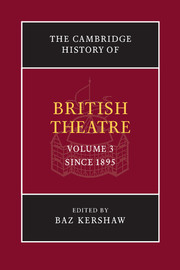Book contents
- Frontmatter
- Part I 1895–1946
- Part II Scottish and Welsh Theatres, 1895–2002
- Part III 1940–2002
- 13 British theatre, 1940–2002: an introduction
- 14 The establishment of mainstream theatre, 1946–1979
- 15 Alternative theatres, 1946–2000
- 16 Developments in the profession of theatre, 1946–2000
- 17 Case study: Theatre Workshop’s Oh What a Lovely War, 1963
- 18 1979 and after: a view
- 19 British theatre and commerce, 1979–2000
- 20 New theatre for new times: decentralisation, innovation and pluralism, 1975–2000
- 21 Theatre in Scotland in the 1990s and beyond
- 22 Theatre in Wales in the 1990s and beyond
- 23 English theatre in the 1990s and beyond
- Bibliography
- Index
- References
16 - Developments in the profession of theatre, 1946–2000
from Part III - 1940–2002
Published online by Cambridge University Press: 28 March 2008
- Frontmatter
- Part I 1895–1946
- Part II Scottish and Welsh Theatres, 1895–2002
- Part III 1940–2002
- 13 British theatre, 1940–2002: an introduction
- 14 The establishment of mainstream theatre, 1946–1979
- 15 Alternative theatres, 1946–2000
- 16 Developments in the profession of theatre, 1946–2000
- 17 Case study: Theatre Workshop’s Oh What a Lovely War, 1963
- 18 1979 and after: a view
- 19 British theatre and commerce, 1979–2000
- 20 New theatre for new times: decentralisation, innovation and pluralism, 1975–2000
- 21 Theatre in Scotland in the 1990s and beyond
- 22 Theatre in Wales in the 1990s and beyond
- 23 English theatre in the 1990s and beyond
- Bibliography
- Index
- References
Summary
In February 1948 nearly 500 delegates gathered in London for an unprecedented four-day meeting designed to tackle no less a task than the complete regeneration of British theatre. The British Theatre Conference attracted a broad sweep of interests: London and regional theatres, drama schools and training colleges, plus national institutions, such as the actors’ union Equity and the umbrella body for amateur theatre, the British Drama League. Some were present as individuals, among them leading West End theatre managers, who collectively had refused to send a representative when they learned that theatre ownership was on the agenda.
Here was an historic opportunity for the British theatre to redefine itself and its relationship to society. The upsurge of interest in culture during World War Two had survived into peacetime, and Labour’s nationalisation programme offered the promise of significant state funding for the arts. The conference, chaired by the writer J. B. Priestley, passed an astonishing array of far-sighted resolutions: on strengthening the Arts Council, establishing a national theatre, reducing and controlling theatre rents and costs through a public authority entertainment tax, renovating theatre buildings, reforming safety and licensing regulations – including a call for Sunday opening and an end to censorship – expanding drama in education, increasing co-operation between amateur and professional theatre, improving professional training and – most contentious of all – regulating entry and re-entry into ‘the profession’ through training or apprenticeship.
Although this impressive roll-call of concerns prefigured the major debates that defined British theatre during the following half-century, the moment of radical change was lost. National economic stringency and the reassertion of conservatism within the theatre itself pushed the profession of theatre down a different path.
- Type
- Chapter
- Information
- The Cambridge History of British Theatre , pp. 377 - 396Publisher: Cambridge University PressPrint publication year: 2004



